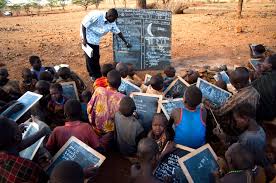The absence of a local framework has led many private schools to adopt foreign curricula, leaving children unprepared for primary school where essential literacy and numeracy skills are expected. However, these skills are often not taught in public schools until later ages. This gap in early childhood education has far-reaching consequences, as it denies children the foundation necessary for future academic success.

Dr. Joy Isa, a renowned education consultant and President of the Isa School of Education, recently shed light on the pressing issues plaguing Nigeria’s educational system. In an interview with News Central, Dr Isa identified the lack of a national curriculum for early childhood education (ages 0-5) as a significant contributor to the staggering number of out-of-school children in Nigeria, estimated at 10.5 million by UNICEF.
Furthermore, Dr. Isa criticized traditional teaching methods that focus on rote learning, arguing that they hinder critical thinking and problem-solving skills. Instead of encouraging independent thought and creativity, these methods often result in students merely copying notes without fully understanding the material. This approach not only fails to equip students with essential skills but also stifles their ability to think critically and solve problems.
To address these challenges, Dr. Isa advocated for urgent reforms in Nigeria’s educational policies. Establishing a national curriculum for early childhood education is crucial, as it would provide a structured framework tailored to Nigeria’s unique needs. Additionally, promoting modern teaching practices that encourage critical thinking, problem-solving, and creativity is essential. This requires providing teachers with the necessary training and resources to effectively implement these methods.
Dr. Isa’s insights highlight the importance of reforming Nigeria’s educational system to better prepare children for their academic futures and reduce the number of out-of-school youths. By establishing a national curriculum and promoting modern teaching practices, Nigeria can equip its children with the skills necessary to succeed in an increasingly competitive world.
Ultimately, the need for reform in Nigeria’s educational policies is urgent. The country’s future depends on its ability to provide quality education to its children, and Dr. Isa’s recommendations offer a crucial starting point for this transformation. By implementing these reforms, Nigeria can pave the way for a brighter future for its children and unlock its full potential as a nation.



